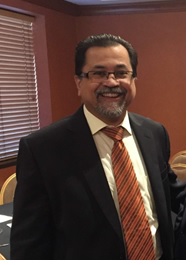Consumers still desire human touch in financial planning
BY PARESH SHAH
At the MDRT Top of the Table Conference in 2021, I took part in a long discussion with my fellow advisors on a burning question: will robo-advisors come to entirely replace human financial advisors, consumers having decided they can meet their financial needs without ever talking with another person? A January 2022 MDRT survey on Fintech (mdrt.org) confirms our conclusion from that conference: clients and prospects still desire an irreplicable human touch in financial planning, but their expectations of financial advisors’ technological proficiency continue to rise.
According to the survey, 56% of Americans want their finances handled by a mix of human advisors, robo-advisors and other technological tools. In the years and decades to come, advisors who successfully incorporate technology into their practice will thrive and they will replace the advisors who fail to answer this call to action.
The Value of Digitalization
Technological standards for financial services professionals do not remain static. They rise every year, driven by consumer expectations and the accelerating integration of technology into everyone’s personal lives. Meeting these expectations is not just a matter of using technology, either: communicating our digital capabilities to clients is equally important. This is especially important for clients under age 45 who, according to the MDRT survey, make up 44% of current clients.
This dual-ended need is particularly clear when it comes to cybersecurity. According to the survey, 75% of consumers find it extremely or very important that financial advisors use cybersecurity tools like password managers or two-factor authentication. At the same time, only 35% of clients report their advisor uses such tools. To be clear, it is not the case that 65% of financial advisors do not use cybersecurity tools. We would know if there was such a gaping hole in our digital defenses in our world full of hackers, scammers and cyberattacks. Instead, financial advisors admittedly, myself included are simply not communicating the tools they use to clients. Advisors must do a better job of demonstrating cybersecurity capabilities to clients both through conversation and through actions like obtaining certifications from cybersecurity providers.
Consumers expect more from advisors on digital communication, too. The survey found that 51% of consumers think it’s extremely or very important that advisors use tools like email, social media, instant messages, webinars and videos to increase communications. But, again, only 35% of clients report their advisor doing so. It’s not that advisors need to offer each and every one of those platforms. But in an era in which our interpersonal communications are stretched across ever more channels, advisors will need to meet clients and prospects more than halfway. To that end, I recently started posting educational videos on my social media platforms to reach clients and prospects who use such websites to learn about finance.
Maximizing the human advantage
Integrating technology is not just important for its own sake — advisors cannot and should not try to replicate the digital operations of a robo-advisor platform. Instead, technology should augment advisors’ biggest advantage over robo-advisors: emotional intelligence and the capacity for trusting, two-way relationships.
According to the survey, 66% of Americans believe the opportunity to establish trust and build a relationship is an advantage human advisors have over robo-advisors. To thrive in the digital age, advisors must fully commit to getting to know their clients as people. With most of my client check-ins happening virtually, I’ve shifted my less common, in-person client meetings to take place over dinner, sports or other recreational activities. This relationship building allows me to better serve my clients through my better understanding of them as individuals.
Such relationships allow advisors and clients to tackle more complex problems together and create deeper understanding of client needs. Take portfolio-building, for example: plenty of robo-advisor platforms present options like “aggressive,” “moderate,” or “conservative” portfolio designs. But what these words actually mean to clients will differ from person to person. Most robo-advisor users don’t have the time or financial knowledge required to effectively individualize their investments without exposing their assets to unintended risk. Human advisors can get to know each individual client’s needs and preferences, no matter how the clients may word them.
Even for robo-advisor users, human advisors can provide an array of additional services well beyond the scope of an app. I currently have two clients who use robo-advisors to manage their brokerage portfolios, while I work with them on life insurance policies, tax optimization, estate planning and ensuring proper financial documentation. Many areas of financial planning still require a human touch and a human eye to truly deliver on client needs. Perhaps that is why, according to the survey, 69% of robo-advisor users have a human financial advisor too.
We have known for a long time that Fintech is here to stay, and
there is undoubtedly an allure to making finance just one more thing that’s handled on your phone. But the emotional advantages of human advisors are not something that can be replicated by any software program. The task facing financial advisors, then, is simple: increasing the technological capabilities of our practices so that our human advantages can be fully utilized.

SHAH has been a wealth strategist for 17 years, specializing in pension and profit-sharing plans, asset protection, estate planning and business succession. He was a cohost of the talk show “Your Money – Your Taxes” on the South Asian American channel ITV Gold. Shah is a 15-year member of MDRT with three Top of the Table and nine Court of the Table qualifications. He resides in Hicksville, New York, with his wife, Shimul. His son is a senior at Hunters College in New York.
Contact: pshah@pareshah.com
